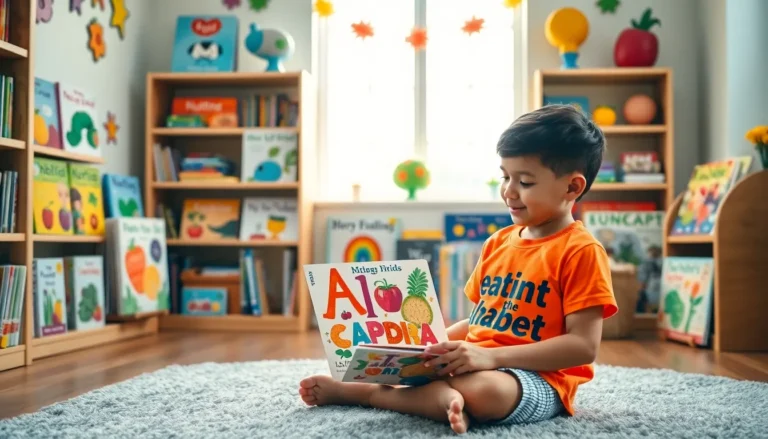Table of Contents
ToggleNavigating the journey of parenthood can be both rewarding and challenging. With constant changes in society and technology, parents often find themselves seeking guidance on how to raise happy, healthy children. This parent guide aims to provide essential insights and practical tips to help parents thrive in their roles.
From understanding developmental milestones to fostering emotional intelligence, the information within this guide empowers parents to make informed decisions. Whether it’s managing screen time or encouraging social skills, every aspect of parenting plays a crucial role in shaping a child’s future. Embracing these strategies can lead to stronger family bonds and a more fulfilling parenting experience.
What Is a Parent Guide?
A parent guide is a resource designed to assist parents in navigating the complexities of raising children. It provides clear and concise information about childhood development, emotional well-being, and practical parenting strategies. Parent guides contain various topics, including:
- Developmental Milestones: Details the physical, emotional, and cognitive stages of a child’s growth.
- Emotional Intelligence: Offers techniques for identifying and managing emotions effectively.
- Screen Time Management: Advises on setting appropriate limits for technology use.
- Social Skills: Guides on fostering positive interactions and relationships with peers.
Parent guides aim to equip parents with the knowledge and tools necessary to make informed decisions. These resources support the parenting journey by addressing contemporary challenges and promoting a healthy family environment.
Importance of Having a Parent Guide

A parent guide serves as an essential instrument for navigating the complexities of raising children. It provides valuable insights and practical strategies, fostering informed decision-making and enhancing parenting effectiveness.
Educational Benefits
Educational resources in a parent guide equip parents with knowledge on childhood learning processes. They outline developmental milestones, enabling parents to monitor their child’s growth effectively. Accessing information on various teaching methods can enhance a child’s academic success. Additionally, a structured approach to home learning can support skills in areas such as literacy, numeracy, and critical thinking. Parents can encourage lifelong learning by using the guide to engage in productive activities that nurture curiosity and creativity.
Emotional Support
Emotional support outlined in a parent guide fosters healthy parent-child relationships. By understanding emotional intelligence, parents can better navigate their children’s feelings and reactions. The guide provides strategies for effective communication, helping parents express empathy and validate their child’s emotions. Additionally, it offers techniques to manage stress and anxiety, enhancing resilience. Parents can build a safe space for children to share their concerns and feelings, significantly contributing to their mental health and well-being.
Components of an Effective Parent Guide
An effective parent guide comprises various components that equip parents with essential knowledge and strategies. Key components include communication strategies and behavioral management techniques that promote healthy family dynamics.
Communication Strategies
Effective communication forms the backbone of a strong parent-child relationship. Parents should focus on:
- Active listening: Demonstrating genuine interest in a child’s thoughts and feelings fosters trust.
- Clear messaging: Using simple language helps children understand expectations and boundaries.
- Non-verbal cues: Body language and facial expressions enhance emotional connections.
- Open dialogue: Encouraging children to express themselves freely supports emotional intelligence and confidence.
- Empathy: Validating a child’s feelings shows understanding and cultivates emotional security.
These strategies enable parents to nurture a supportive environment, enhancing their child’s emotional well-being and communication skills.
Behavioral Management Techniques
Behavioral management techniques guide parents in addressing challenging behaviors effectively. Key techniques include:
- Positive reinforcement: Rewarding desirable behaviors encourages repetition; praise and small rewards can motivate change.
- Consistent consequences: Implementing fair and predictable consequences for negative behaviors teaches responsibility and accountability.
- Setting clear boundaries: Establishing and communicating limits helps children understand acceptable behavior.
- Modeling behavior: Demonstrating appropriate actions and reactions shows children how to navigate social situations.
- Problem-solving skills: Teaching children to identify solutions for their own issues promotes independence and critical thinking.
By applying these techniques, parents foster an environment conducive to behavioral growth and self-regulation while addressing their children’s developmental needs.
Resources for Creating a Parent Guide
Creating a comprehensive parent guide involves accessing a variety of valuable resources. Parents should focus on reputable websites, books, workshops, and community programs as primary sources of information.
- Reputable Websites: Utilize websites like the American Academy of Pediatrics (AAP) and Zero to Three. These platforms offer evidence-based information on child development, parenting techniques, and educational resources.
- Books: Consider reading books like “The Whole-Brain Child” by Daniel J. Siegel and Tina Payne Bryson or “How to Talk So Kids Will Listen & Listen So Kids Will Talk” by Adele Faber and Elaine Mazlish. These texts provide insights into child psychology and effective communication strategies.
- Workshops: Participate in parenting workshops offered by local community centers, schools, or parenting organizations. Workshops often cover specific topics such as childcare, positive discipline, and emotional intelligence.
- Community Programs: Engage with local parenting support groups or programs. These organizations often provide resources, networking opportunities, and shared experiences that foster parents’ abilities to navigate challenges.
- Online Courses: Explore online courses focused on parenting skills, child development, and emotional well-being. Platforms like Coursera and Udemy offer user-friendly courses that parents can complete at their own pace.
These resources collectively enhance the creation of a parent guide, equipping parents with essential knowledge and tools to raise happy, healthy children.
Navigating the journey of parenthood can be both rewarding and challenging. A well-structured parent guide serves as an essential tool for parents seeking to foster their child’s growth and development. By utilizing effective communication strategies and behavioral management techniques parents can create a nurturing environment that supports emotional well-being.
Accessing reliable resources further empowers parents to make informed decisions. With the right knowledge and support parents can enhance their parenting experience and build stronger family bonds. Embracing these insights not only enriches their lives but also contributes to raising happy and healthy children in today’s ever-changing world.







